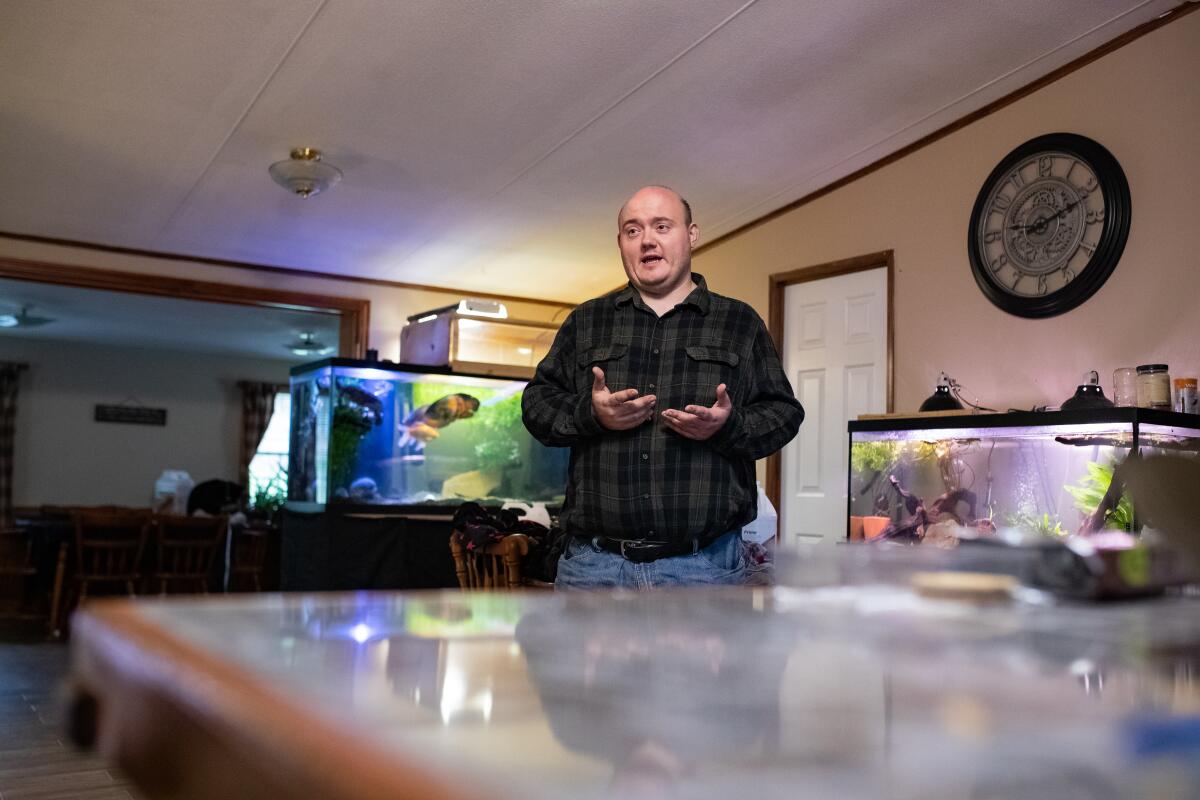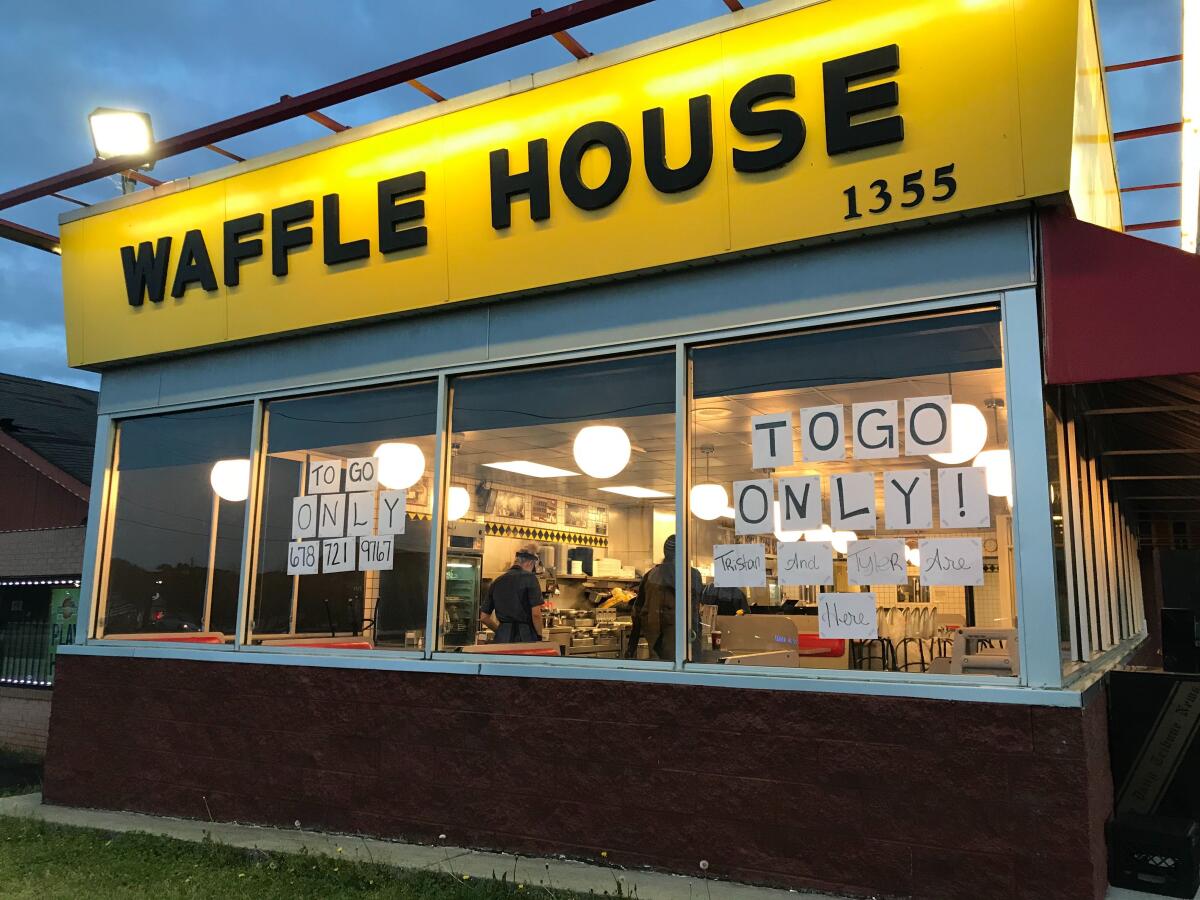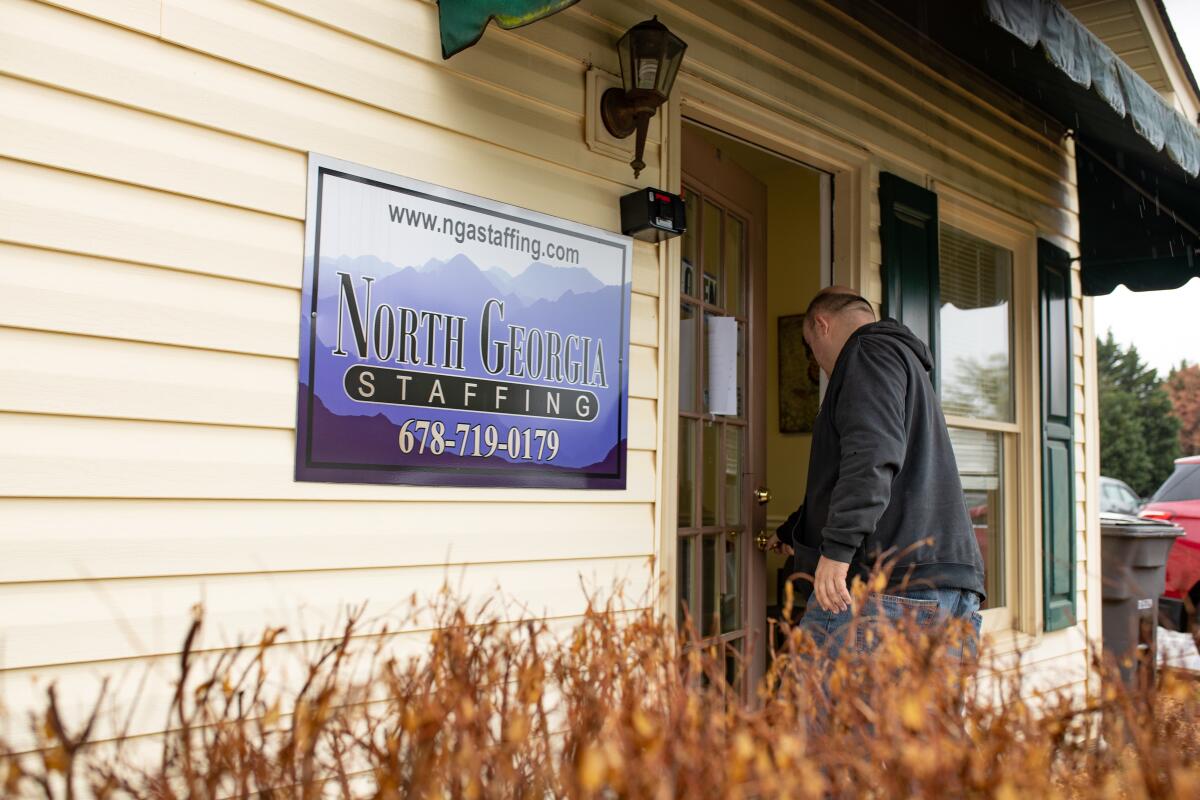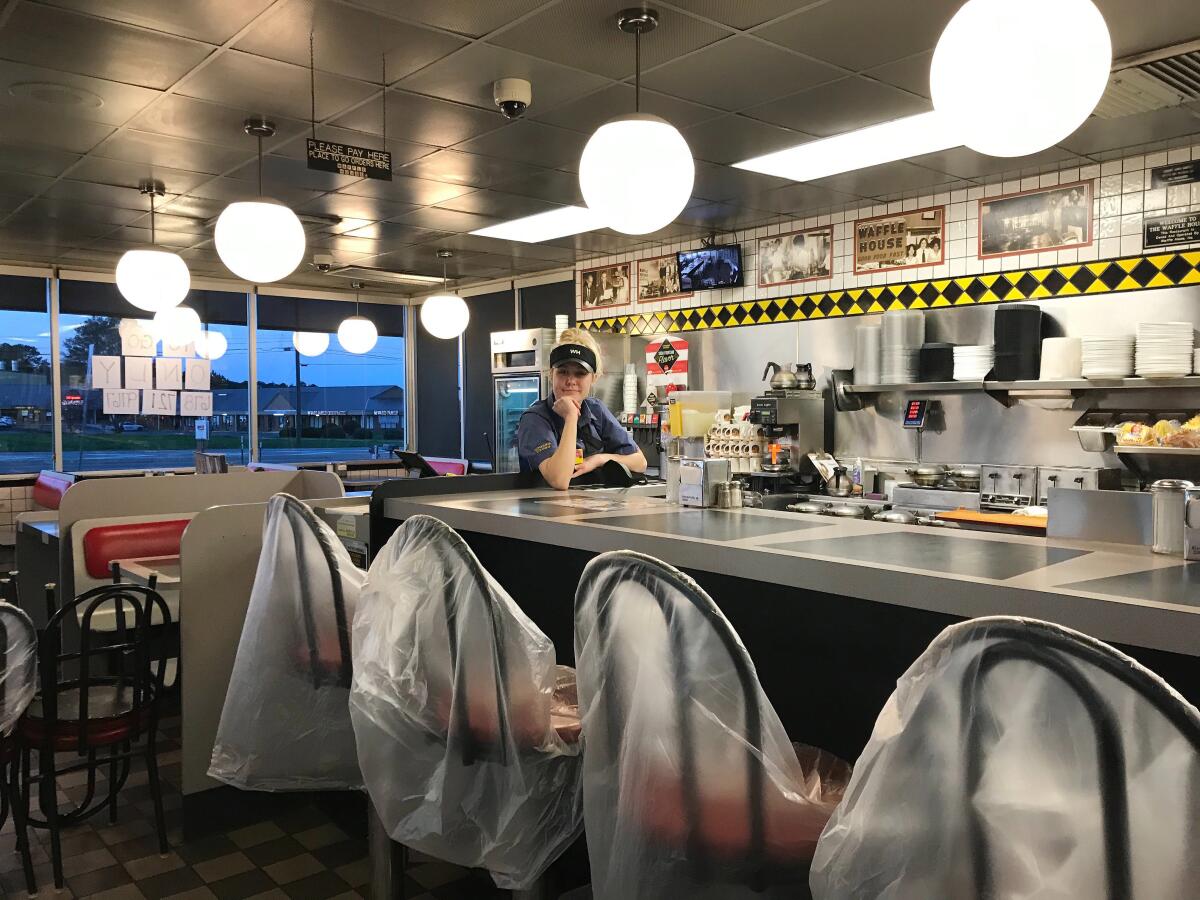He survived COVID-19. He’s broke. But he thinks America is overreacting

Joey Camp was the first person in Georgia to be quarantined at a special site after being diagnosed with COVID-19.
- Share via
CARTERSVILLE, Ga. — For three days, he was hooked up to an oxygen tube. For six days after that, he was cooped up in a 26-foot RV in a special quarantine camp run by the state of Georgia.
So when Joey Camp, a 30-year-old Waffle House line cook, learned he no longer had COVID-19 and could go home, he figured things were getting back to normal. Immediately, the former National Guardsman started making lunch and dinner plans: all-you-can-eat wings at Hooters? A super burrito from Los Arcos Mexican restaurant?

Soon, heavier concerns loomed. The divorced father of two made $10.65 an hour at Waffle House and has lived with friends since being evicted last year from his apartment. After leaving quarantine, he worked just one shift before his boss cut his hours because so few customers were coming in. His other part-time gig, as a party bus driver, went away.
“I’m making zero dollars for the foreseeable future,” Camp said. “A person who makes $50,000 or $60,000 a year just isn’t understanding what this means.”
Almost every day since he got out of quarantine, Camp has squeezed into his dusty black ’98 Chevy Camaro with its cracked windshield and driven, seat belt unbuckled, to a string of restaurants: Hooters and Applebee’s, Waffle House and Buffalo’s, Los Arcos and Huddle House.
Inside, he has sought to resume small acts: greeting a server, sitting in a booth, perusing a menu.

Until now, COVID-19 has mostly been experienced through the lens of metropolitan areas: Seattle, San Francisco, Los Angeles, New York. But as the virus spreads into rural and small-town America, significant numbers of Americans continue to dismiss calls for more aggressive social distancing and shutdowns.
Media sensationalism and liberal fear-mongering, they say, will destroy the economy.
“With all the craziness going on in the world, America should show people that this is not something that should shut down countries,” Camp said after wiping his hands at a sanitizing station posted at the entrance of 7 Tequilas restaurant. “We need to be the adults in the room.”
Public health officials say that such doubters pose a major obstacle to efforts to reduce the spread of the virus and prevent mass casualties.
The coronavirus is at least 10 times deadlier than the flu and can be transmitted by people who are infected but asymptomatic. Even though many cases are mild, especially in the young, widespread infection could lead to hundreds of thousands or even millions of deaths.
A libertarian who voted for President Trump in 2016 and plans to vote for him again, Camp compares COVID-19 to the flu.
“It’s not going to kill the vast majority of the population,” he said. “People are hearing 3.4% mortality. They’re not hearing the 96.6% survival rate.”
Polls show that Democrats and those living in large cities and suburbs have significantly more anxiety about COVID-19 than Republicans and residents of small towns and rural areas.
While Democratic strongholds like California and New York have banned public gatherings and closed restaurants, reaction to the pandemic has been slower and more uneven in Republican states, like Texas and Florida, where distrust of big-government regulations coincides with suspicion that the media is overplaying worst-case scenarios.
A good chunk of conservatives have also taken their cue from Fox News, whose pundits were late to take the virus seriously and are now backing Trump’s call to reopen the economy. (Camp doesn’t have cable, but he uses his smartphone to follow commentary on Daily Wire, Fox News and CNN.)
Cartersville is a fast-growing farming and manufacturing hub of about 20,000 people northwest of Atlanta. Here, pastures with horse fences increasingly give way to subdivisions and strip malls.
It also is one of the epicenters of the coronavirus in Georgia. More than 80 people in Bartow County have tested positive and a 69-year-old man has died. The local medical center has erected outdoor triage tents and a large sign saying, “We are all in this together.”

In Georgia, where more than 1,200 residents have tested positive, with 394 hospitalized and 40 dead, Republican Gov. Brian Kemp has been reluctant to institute widespread business closures. On Monday he ordered bars to close and banned public gatherings of more than 10 people, but he has yet to shutter restaurants.
Bartow County officials have taken matters into their own hands, closing all bars, dine-in restaurants and theaters.
While Camp distinguishes himself from his father, a conventional Southern conservative who he said would march with Trump to the gates of hell, he insists there are still too few coronavirus victims to warrant extreme government intervention.
“We have probably more owners of chickens in this county than we have coronavirus victims and there aren’t that many farms around here,” Camp said as he stood outside his friends’ home on a rolling green pasture dotted with ducks, Canada geese, turkeys and chickens.
As if on cue, a rooster crowed in the background.
::
When Camp came down in late February with a cough, he figured he had the flu or pneumonia and could tough it out. After growing up in poverty in a trailer park — the son of a construction worker father and drug dealer mother — Big Bad Joey could take care of himself.
So he carried on with his commitments, officiating at the wedding of one of his best friends and frying bacon over a hot grill at Waffle House, until eventually the chills and body aches became so severe he had to hole up at home.
Finally, when curling under the covers wouldn’t stop his chills and chattering teeth, he went to an emergency room.
A diabetic, he was diagnosed with pneumonia. After a few days, he tested positive for the virus.
Camp had no clue how he contracted the virus and assumes it came from someone who was asymptomatic. He hadn’t been overseas. He hadn’t taken a cruise or ventured to the West Coast.
After four days in the hospital, his symptoms abated. He decided not to self-quarantine at home — he was living with a family with an infant son — and became the first Georgian to live in a special quarantine site at Hard Labor Creek State Park, about 50 miles east of Atlanta.
As he recuperated in his trailer, watching Star Wars movies and “Ferris Bueller’s Day Off,” Camp was aghast as officials closed schools, urged people to work from home, and shut down major sporting events.
Camp made light of the situation on Facebook, sharing a stream of memes (“I want to get quarantined with you — flirting in 2020”) and a Tik-Tok video of a pole dancer dressed up in a white hazmat suit, black platform stilettos and orange rubber gloves spraying anti-anti-disinfectant on a pole (“When there’s a coronavirus outbreak but you have bills to pay”).
Leaving quarantine, he was shocked by what seemed like extreme behavior.
At a Circle K gas station, he watched a man put on surgical gloves to go to the restroom, take off the gloves when he came out, wipe his hands down with baby wipes, pump gas and then wipe his hands with baby wipes again.
“It’s like ‘Mad Max,’” he said as he drove down a four-lane highway, passing very few cars. “It’s kind of weird. It’s like everybody’s holding their breath, waiting for either society to collapse or society to get back to normal.”
When Camp returned to the Waffle House, which had temporarily closed after his diagnosis, for his first shift after the quarantine, Camp urged folks on social media to drop in and meet “King Coronavirus.”
Walking back into the diner, Camp felt like Michael Jordan returning to the Chicago Bulls in ’95 after his foray into baseball.
Andrea, a server, wrapped her arms around him.
Two other servers gave him elbow bumps.
It was like he never left.

But only a smattering of customers sat in the restaurant. As business slowed, his next shifts were canceled.
With minus $3.33 in his checking account and no savings, it wasn’t like he wasn’t any better off than his co-workers.
“If I have to, I’ll make a bow and arrow and go hunting in the woods,” he said after driving past the nearly deserted Waffle House.
If things got really desperate and society collapsed, at least his roommate, Trey, has a couple of pistols, an AR-15 and a 12-gauge shotgun.
A few hours later, he was on the porch with Trey when his boss called: the diner would close, at least for now.
“It doesn’t make any sense,” he said. “When Waffle House shuts down, that’s crisis mode.”
He paused, shaking his head.
It didn’t feel like crisis mode. All around him, everything was calm: wind chimes tinkled softly in the spring breeze; birds chirped as they flitted around a pair of blooming Bradford pear trees.
“I don’t know how to deal with it,” he said. “It does not compute at all.”
But when he picked up his cellphone to check the number of new coronavirus cases, doubt crept in. Was he wrong? Could he get reinfected?
“Worldwide, it’s starting to kill more people,” he said. “Maybe this thing is mutating and becoming more deadly. And that worries the hell out of me, because that puts me back in the pool.”
By Wednesday, he had found a temporary job — making hand sanitizer.
More to Read
Sign up for Essential California
The most important California stories and recommendations in your inbox every morning.
You may occasionally receive promotional content from the Los Angeles Times.







